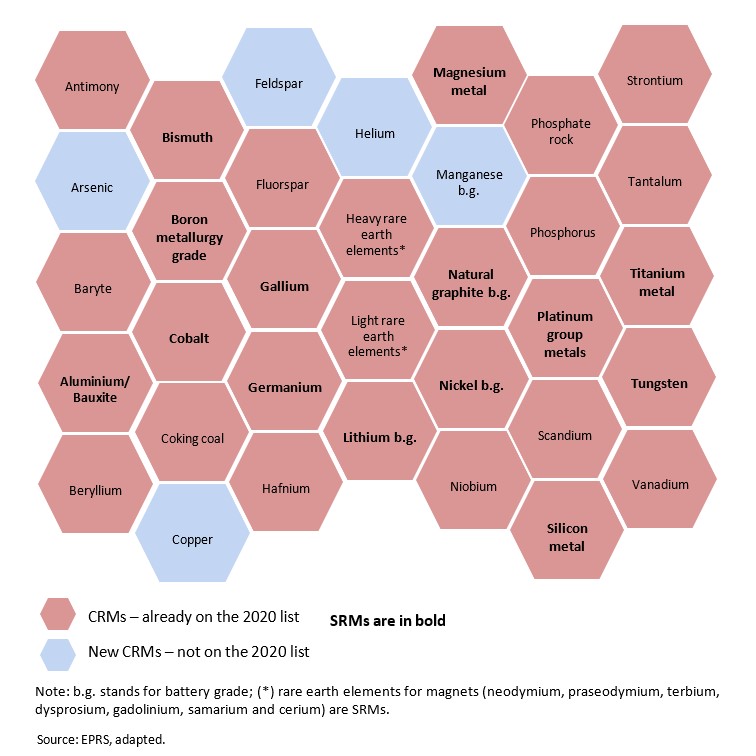ESG outlook: proposals for Net-Zero Industry Act and Critical Raw Materials Act move into decisive phase under Belgian presidency of the European Council
This autumn, the European Parliament adopted its position on the European Commission’s proposals for the Net Zero Industry Act (NZIA) and also reached an informal agreement with the negotiators of the Council on the Critical Raw Materials Act (CRM Act). Following our previous article on the introduction of these EU legislative initiatives as part of the EU’s Green Industrial Plan, this article briefly discusses the position of the European Parliament on the proposed NZIA and CRM Act.
NZIA
On 21 November 2023, the European Parliament adopted its position on the NZIA proposal, which intends to bolster Europe’s manufacturing output in technologies needed for decarbonisation. The NZIA sets a target for Europe to generate 40% of its yearly deployment requirements using net-zero technologies by 2030, as outlined in National Energy and Climate Plans (NECPs). Moreover, the proposed Act (or rather regulation) aims to secure 25% of the worldwide market value for these technologies and addresses the obstacles related to expanding manufacturing capacities in this sector.
Following the Parliament’s amendments, the scope of the NZIA proposal was broadened and now encompasses the entire supply chain and to include components, materials and machinery for producing clean energy technologies. In relation to the proposed Article 31 NZIA, MEPs have proposed a wide, more comprehensive list of technologies to be covered and to be updated periodically. They have included specific industrial technologies, sustainable aviation fuels, and nuclear fission and fusion technologies. In particular, electrolysers and fuel cell technologies are included, which are crucial for energy storage in order to accelerate the roll out of renewables and the process of electrification.
The proposed NZIA also aims to streamline the permitting process with a timeline for authorisation of 9 to 12 months for regular projects and 6 to 9 months for strategic projects. In addition, the EP has proposed the creation of ‘’Net-Zero Industry Valleys’’ initiatives, to speed up the permitting process by delegating parts of the environmental assessment collection to Member States.
As the amended proposal has been adopted by the European Parliament, it is now for the European Council to determine its position, after which the discussions on the ultimate text of the regulation can commence. We expect this to be on the agenda of the Belgian presidency of the Council for the first quarter of 2024, as pursuing the green transition and continuing the Green Deal plan are firmly set on its list of priorities.
CRM Act
In September 2023, the European Parliament adopted its position on the CRM Act, which is another part of the Green Industrial Plan and crucial to secure the EU’s transition to sustainable, digital, and sovereign future. The CRM Act aims to ensure to secure the supply of critical raw materials that are crucial in a wide range of industrial ecosystems and present a high supply risk.
The CRM Act distinguishes between 34 ‘critical raw materials’ of which 17 are defined as ‘strategic raw materials’. Critical raw materials (CRMs) are rare materials or elements, often metals or rare earth materials, which are critical for a wide range of fifteen key technologies and for the supply of which the EU strategically depends on imports. Strategic raw materials (SRMs) concern a sub-set of CRMs which are defined as ‘‘raw materials that are of high strategic importance for the functioning of the internal market… are characterised by a potentially significant gap between global supply and projected demand, and for which an increase in production is relatively difficult’’.
The EP added Aluminium/Bauxite [Am. 5] to the list of ‘Strategic Raw Materials’ mentioned in Annex I of the CRM Act, bringing the total number up to 17 SRMs in comparison to the original 16 SRMs. Additionally, CRMs pursuant to Annex II of the CRM Act encompass “all strategic raw materials and any other raw materials that is of high importance to the Union’s economy overall and for which there is a high risk of supply disruption.” Furthermore, it is vital to create a level playing field for innovative and sustainable alternatives for the Union. Therefore, the goal is to diversify the EU’s supply in a mutually beneficial manner as well as ensuring equality for all parties involved. The CRM Act identifies measures to diversify imports of critical raw materials ensuring that not more than 65% of the Union’s consumption of each strategic raw material comes from a single third country.

Furthermore, the CRM Act aims to encourage innovation throughout the entire value chain, assist SMEs and advance research and development in alternative materials as well as to promote environmentally friendly mining and production methods. The EP also highlights the significance of establishing strategic long-term partnerships between the EU and third countries concerning critical raw materials. In that regard, MEPs aim to not only lay the groundwork for enduring partnerships that involve knowledge, training and technology transfer but also to advocate to adhere to the highest ecological standards when extracting and processing in partner countries.
The Commission and the Member States should strengthen the Union’s capacities to significantly increase each strategic raw material’s capacities by 2030 (Article 4a CRM Act). Hence, the Union’s extraction capacity needs to produce at least 10% of the annual consumption of strategic raw materials as well as processing capacity needs to produce at least 40% of the on the market annual consumption of strategic raw materials. The Union’s recycling capacity needs to produce at least 25% of the annual consumption of strategic raw materials as well as is able to recycle significantly increasing amounts in waste.
Another important development is the aim by the European Parliament to strengthen the protection of biodiversity, human rights, and democracy and the rule of law. For instance, regarding the application and recognition of CRM-projects, the MEPs suggested that:
“The Commission, when assessing the application, shall take into account any proven track record in human rights or environmental infringements that took place in the 5 years prior to the application, and any mitigation measures taken.”
When dealing with environmental protection, human rights, and protection biodiversity, one automatically enters into the area of ESG. From a broader ESG perspective, the CRM Act also interacts with other ESG legal instruments like the Corporate Sustainable Reporting Directive (CSRD) and in particular with supply chain management under the (proposed) Corporate Sustainable Due Diligence Directive (CSDDD).
Finally, the EP strengthened the emphasis on research and innovation concerning potential substitute materials and production processed. Moreover, the EP sought to promote circularity by promoting the extraction of more strategic raw materials from waste products and stressing the necessity of cutting the red tape for companies, especially for SMEs.
The draft legislation was adopted by the European Parliament, which has led in November 2023 to an informal agreement with the Spanish presidency of the Council.
Conclusion
At the start of 2024, both proposals are ready to be concluded within the next months. As soon as the EP and Council also reach an informal agreement on the proposed NZIA, both proposals can be approved by both Parliament and Council under the Belgian presidency in order to become law.




